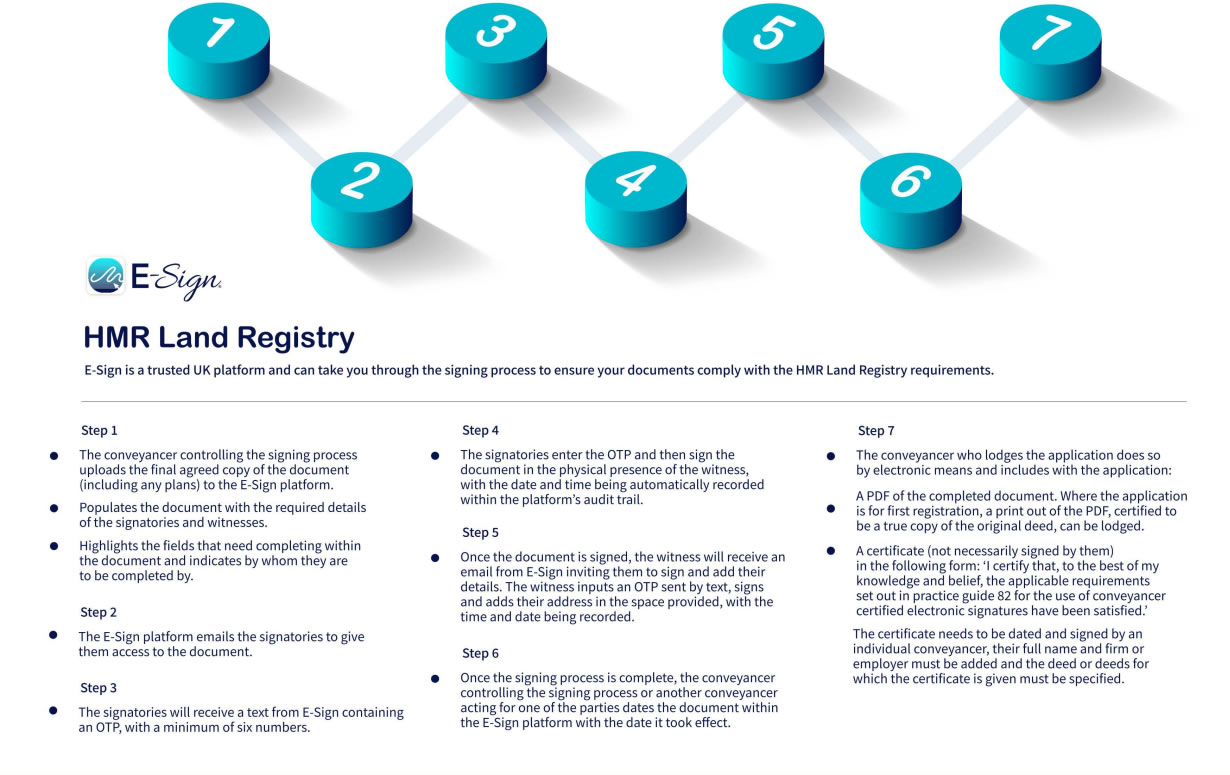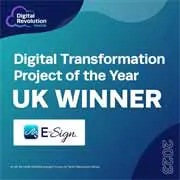Home | News & Insights |
E-Sign Paves the Way for Electronic Signatures in HM Land Registry
Laura Cain
Marketing & Brand Manager
PUBLISHED
24th July, 2023
Contents
After working together with HM Land Registry on their electronic signature policy, we are pleased to announce that they will now be accepting electronically signed documents for the registration of transfer deeds and other forms of depository deeds.
Using traditional ‘wet’ signatures have suddenly become a lengthy and inconvenient process, that only serves to slow down important business transactions, and in the case of HM Land Registry, slow down people’s lives. With traditional handwritten signatures, you need access to printing, scanning, and posting. Then there’s the issue of witnessing, and the added difficulty of arranging meetings with a conveyancer during social distancing or localised lockdowns.
With customers increasingly asking if they accept electronic signatures and the very real need for effective digitalisation, HM Land Registry has consulted with regulators, trade bodies, conveyancers, lenders, estate agents and providers like E-Sign, to address the viability of digitalising property transactions and the security of electronic signatures.
How could E-Sign help?
An experienced electronic signature provider, E-Sign has successfully deployed electronic signature solutions across a variety of sectors. E-Sign has previously implemented electronic signatures in a Top 100 Law firm, helping them achieve substantial financial savings and increasing company productivity by digitalising their document signing processes.
By using electronic signatures, the Law Firm was able to significantly reduce the time spent on document administration, saving approximately 50% of time previously spent on various tasks associated with traditional document processes. Electronic signatures also reduced the turnaround time on document signing from 21 days to just 3, so those important contracts and transactions could be closed within a matter of days, rather than weeks.
Besides streamlining processes and helping the company achieve considerable savings on time, using electronic signatures significantly contributed to an annual financial saving of £284k by reducing company spending on paper, printing, and postage. E-Sign’s electronic signature solution was able to achieve all this, without compromising security and legality, demonstrating the ground-breaking potential of electronic signatures in a legal setting.
As an accredited UK government supplier and registered ICO data processor, E-Sign were happy to share this experience with HM Land Registry during their assessment of electronic signatures and the challenges of security and identity verification.
The Legality of Electronic Signatures in Property Transactions
Electronic signatures have been legally acceptable in the UK since 2000, with the introduction of the Electronic Communication Act 2000. Electronic signatures have also been eIDAS compliant since 2016, aligning the UK with EU electronic signature standards. Further to this, the Law Commission recently concluded that electronic signatures can be used to execute a document, including deeds, and can be witnessed in the same manner as traditional handwritten signatures.
Previously, the HM Registry did not accept electronically signed documents for property transactions citing the lack of “control of the means of execution used for documents that must be registered, particularly where title guarantee is offered”. After consulting with industry experts, such as E-Sign, HM Registry now feel capable of accepting electronic signatures without compromising security.
Digitalising HM Land Registry Processes with Qualified Electronic Signatures
Whilst we use the generic term ‘electronic signature’, there are actually three types of electronic/digital signatures:
Simple Electronic Signatures
Pros
- Tick box plus declaration or scanned signature- easy and simple to use for low value transactions
- Legally acceptable under eIDAS
Cons
- No way of verifying identity of signatory
- Would require a witness to be valid for property transactions
Advanced Electronic Signatures
Pros
- Uniquely linked to signer
- Signer can be identified
- Secure signing
- Data change is traceable
- eIDAS compliant
Cons
- Not 100% reliable
- Identity checks could not meet highest standards
Qualified Electronic Signatures
Pros
- Links signer’s identity to signature
- Qualified certificate supplied by Qualified Trust Service Provider
- Can be use for high risk transactions
- Signature managed by a Qualified Electronic Signature Creation Device
- 100% capable of identifying signatory
Cons
- Can be impractical for one-off uses e.g. housing transactions
Given their enhanced security and identity verification, HM Land Registry have opted to digitalise their documentation process with Qualified Electronic Signatures (without a witness). They will also now be accepting witnessed electronic signatures, in lieu of traditionally signed documents.
Where a witness is required, they would have to witness the digital signing in person, then electronically sign a declaration themselves as confirmation. The time and date of both signatures would be electronically recorded to make sure they’re contemporaneous, helping to verify the witness’s signature.
Cryptographic Biometrics- the Future of Remote Identity Verification?
As part of the discussion on the security and verification of electronic signatures, there is much excitement around the potential of cryptographic biometrics. Verifying the identity of both parties in any transaction is of paramount importance to prevent property fraud, and this represents a distinct challenge for the digitalisation of HM Land Registry processes.
Whilst Qualified Electronic Signatures can verify the signatories through secure signing and certification, HM Land Registry, the Council for Licensed Conveyancers (CLC) and the Chartered Institute for Legal Executives (CILEx) are now exploring the possibility of cryptographic and biometric identity checks, using microchip-enabled passports or identity cards, a smartphone and an app, similar to the remote identification technology harnessed by the Home Office for the EU Settlement Scheme.
With digital identity checks, the signatory can download an app on their smartphone, which can read the biometric chip and check the validity of the passport. The user will then record a video of their face on the app, which will use facial recognition to match the passport to the holder for near-instant identity verification. This technology would be easy to use, and could represent an affordable, remote verification solution for conveyers, providing an additional layer of security for property transactions.
Are E-Sign’s Electronic Signatures HM Land Registry Compliant?
“We need to be sure that not only has a document been signed in a way that would give it proper legal effect, but also that the process was secure and the risk of fraud minimised”-HM Land Registry
Our electronic signatures provide users with a high level of security and identity verification, making them compliant with the HM Land Registry electronic signature legal requirements:
- They are uniquely linked to and capable of identifying the signatory
- They are created in a way that allows the signatory to retain control
- They are linked to the document in a way that any subsequent change of the data is detectable
Beyond this, our electronic signature solution has the following features to minimise the risk of fraud and to create a traceable digital trail:
- Digital Signature Certificate
- IP address recorded
- QR code unique to individual & document
- Unique digital fingerprint generated with each new signature
- Full audit trail
With our secure platform, data encryption and state-of-the-art storage servers, we can provide a compliant electronic signature for the secure digitalisation of property transactions to an industry in much need of modernisation.
E-Sign is a leading provider of electronic signature solutions supplying professional Electronic Signatures,Web Forms, ID Checker and Personalised Email solutions to businesses across the UK.
To find out more about our E-Sign solutions and how they could tr/electronic-signature/ansform your business, give us a call today on (+44) 0330 057 3001 or email us at info@esign.co.uk
 Facebook
Facebook
 X (Twitter)
X (Twitter)
 LinkedIn
LinkedIn












